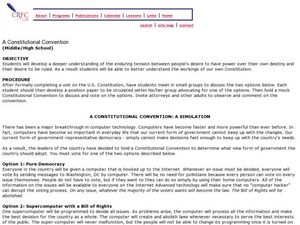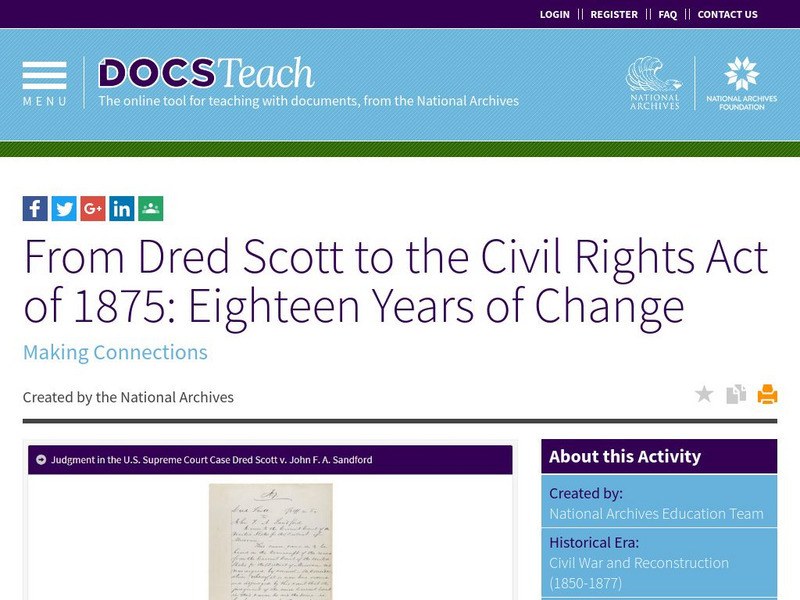School Improvement in Maryland
Supreme Court Case Overview I
As part of a study of the 14th Amendment to the United States Constitution, class members examine four Supreme Court decisions—Gitlow v. New York, Mapp v. Ohio, Gideon v. Wainwright, and Griswold v. Connecticut—that incorporated the due...
Curated OER
Constitutional Amendments and Gay Marriage
High schoolers study the legal battles involving same-sex marriage. They examine primary sources and a video regarding the 14th amendment and its implications for gay marriage. They analyze a report of a California case that was sent to...
State Bar of Texas
Dred Scott v. Sandford
Who decides someone is not a real person? Scholars investigate the Dred Scott v. Sandford court case which deals directly with slavery and citizenship. After viewing a short video clip, classmates work in pairs to assess and discuss the...
Curated OER
Fugitive from Labor Cases: Henry Garnett (1850) and Moses Honner (1860)
Students engage in the comparison of cases which demonstrate the increasingly volatile political crisis in the 1850s arising over the issue of slavery and the necessity for the enactment of the 13th, 14th, and 15th Amendments to the U.S....
Curated OER
A More Perfect Union: Barack Obama's Race Speech at the National Constitution Center
Eleventh graders explore the process of perfecting the Union through changes made to the Constitution, and through the powers delegated to each branch of government. In this American Government lesson, 11th graders research various...
Curated OER
Government Lesson Plan: Lesson Plan 8
Learners analyze the Fourteenth Amendment. They discuss Reconstruction, read the provisions of the Fourteenth Amendment, define the provisions, and in small groups analyze a Supreme Court case that was impacted by the due process clause.
Curated OER
John Gary Evans and the Politics of Race
Students read letters written by Evans and Gunton regarding race relations. In this Progressive Movement lesson plan, students interpret the intentions and tone of the letters to understand contemporary racial beliefs. Students discuss...
Curated OER
In the Courts
Learners explore desegregation in the courts. In this civil rights lesson, students listen to their instructor present a lecture on Supreme Court cases Brown v. Board of Education and Plessy v. Ferguson. Learners examine the cases and...
Curated OER
A Time for Justice
Students engage in a lesson that focuses on the development of The Bill Of Rights in the United States. They conduct research using a variety of resources. Students two focus questions in order to guide the information search. They state...
Curated OER
A Time for Justice
Middle schoolers explain the protections and privileges of individuals and groups in the United States.
Curated OER
A CONSTITUTIONAL CONVENTION: A SIMULATION
Young scholars discuss two computerized options to change the current U.S. government. In this Constitutional Convention instructional activity, students write a statement advocating for one of the choices and participate in a mock...
Curated OER
Reconstruction
Students investigate the historical period of the Reconstruction and the events that surrounded the abolitionist movement. Students use guided questions to conduct research. Then they complete a venn diagram in order to compare two...
Curated OER
Role of Arkansas women in desegregation and integration
In groups, describe the role of Daisy Bates and Elizabeth Eckford in Desegregation.
Curated OER
Role of Arkansas women in desegregation and integration
Describe the role of Daisy Bates and Elizabeth Eckford in Desegregation.
Curated OER
Segregation in Prince Edward County
Eleventh graders examine the history of integration as it applied to Virginia high school in Prince Edward County. They evaluate a map of Virginia counties, read and analyze a first person narrative of a young girl involved in a boycott...
Curated OER
The Right to Remain Resilient
Young scholars examine the Civil Rights Movements in the U.S., both current and historic. In small groups students investigate a specific civil rights group, create an illustrated timeline, noting key events, people, and state and...
iCivics
I Civics: Dred Scott v. Sandford (1857)
This mini-lesson covers the basics of the Supreme Court decision that determined that Dred Scott, having lived in a free territory, was not entitled to his freedom. Students learn about the impact of the Court's decision, and how it was...
US National Archives
National Archives: From Dred Scott to the Civil Rights Act of 1875
The Dred Scott case decided that African Americans were not citizens of the United States. However, 18 years later they would have citizenship and many other rights. Learners will examine the following documents to understand how and why...



















